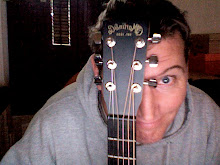Good piece in the Washington Post today about the future for reality television. It's the concluding instalment of "Joe Millionaire" tonight, and the Post's Paul Farhi makes some interesting economic points about the genre from both supply and demand sides. Are we close to audience saturation? Seemingly not. In fact, if anything what we might end up seeing is even more "ordinary" (that is, non-selected, or genuinely "real" ) subjects.
We're maybe not quite at the stage of having Series 7 for real, but you never know. (And the crucial art-imitating-life element here is the million dollar prize - where something desirable is at stake, all bets on who would do what to whom, and who would watch, are largely off).
If some of the predictions made for vlogs (video blogs) end up being even remotely accurate, we - the audience - could end up visually eavesdropping on, effectively, ourselves. The key is at what point does that content become mainstream? Is it with the first glow of site sponsorship, or when vlog sessions are scheduled, listed and advertised by someone like TVGuide. (Actually, it would be more likely to be an online equivalent of TiVo or GemStar, that uses an intelligent agent to seek out vlogs that match your pre-selected criteria).
And that's not much of a leap. Remember, it wasn't that long ago that a content provider like the Washington Post started advertising its regular, timed, online chat sessions. The next stage of micro-publishing is the collating, packaging, scheduling and offering for "sale" of the content.
One reality show we'll be taking a specific interest in is Fox's American Candidate. With the popularity of particpatory shows like American Idol, and the corresponding lack of credibility of modern professional politicians, it was only a matter of time before something like this emerged. The idea is that instead of a record contract, the winner gets a shot at standing as an independent in the 2004 election.
Ludicrous? Perhaps. But before you get up on that high horse, just remember the small matter of a 36-day, 24-hour reality soap opera we went through in November and December 2000. How ludicrous was that?
Read what the Center for Individual Freedom has to say about how the show might be in contravention of all manner of campaign finance legislation.
Comment?
We're maybe not quite at the stage of having Series 7 for real, but you never know. (And the crucial art-imitating-life element here is the million dollar prize - where something desirable is at stake, all bets on who would do what to whom, and who would watch, are largely off).
If some of the predictions made for vlogs (video blogs) end up being even remotely accurate, we - the audience - could end up visually eavesdropping on, effectively, ourselves. The key is at what point does that content become mainstream? Is it with the first glow of site sponsorship, or when vlog sessions are scheduled, listed and advertised by someone like TVGuide. (Actually, it would be more likely to be an online equivalent of TiVo or GemStar, that uses an intelligent agent to seek out vlogs that match your pre-selected criteria).
And that's not much of a leap. Remember, it wasn't that long ago that a content provider like the Washington Post started advertising its regular, timed, online chat sessions. The next stage of micro-publishing is the collating, packaging, scheduling and offering for "sale" of the content.
One reality show we'll be taking a specific interest in is Fox's American Candidate. With the popularity of particpatory shows like American Idol, and the corresponding lack of credibility of modern professional politicians, it was only a matter of time before something like this emerged. The idea is that instead of a record contract, the winner gets a shot at standing as an independent in the 2004 election.
Ludicrous? Perhaps. But before you get up on that high horse, just remember the small matter of a 36-day, 24-hour reality soap opera we went through in November and December 2000. How ludicrous was that?
Read what the Center for Individual Freedom has to say about how the show might be in contravention of all manner of campaign finance legislation.
Comment?


0 Comments:
Post a Comment
<< Home